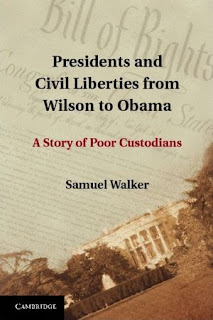 Here he shares some ideas for a cinematic adaptation of his latest book, Presidents and Civil Liberties From Wilson to Obama: A Story of Poor Custodians:
Here he shares some ideas for a cinematic adaptation of his latest book, Presidents and Civil Liberties From Wilson to Obama: A Story of Poor Custodians:Fox Movietone News! August 8, 1974. President Richard Nixon speaks from the White House: “My fellow Americans, I am a crook. Consequently, I shall resign my office...”Learn more about the book and author at Samuel Walker's website.
How do you make a movie out of a 510 page book that covers 17 American presidents and a broad range of civil liberties controversies? Do it as one the old newsreels that used to precede the feature film along with the prevues and the cartoon. So Presidents and Civil Liberties: The Movie will appear as highlights from Fox Movietone News.
The script is based on a talk I gave on “The Great Speeches Presidents Never Gave – But Should Have.” Over the last century, several presidents have perpetrated terrible violations of individual rights. Franklin D. Roosevelt put Americans in concentration camps– the only president ever to do so. Woodrow Wilson suppressed all dissent during World War I. And the list goes on. The point of the presentation, and now the movie, is that they could have chosen a different course of action. They could have chosen to respect the Bill of Rights. The movie presents the speeches they could and should have given.
President Nixon famously did say “I am not a crook,” and he never admitted any personal guilt for the Watergate break-in and cover up that drove him from office. He could have admitted his responsibility and left office with at least some shred of honor, but did not.
In the second segment President Franklin D. Roosevelt delivers one of his famous “fireside chats” from the White House in February 1942. Following Pearl Harbor, there were demands for evacuating all Japanese Americans from the west coast. Responding to these demands, FDR eloquently declares that “we do not punish people because of their race or national origins. That’s what the Nazis do.” (Of course, he conveniently overlooked American racism and segregation, but that is another long story.) “In this war,” he continues, “we are fighting for democracy and the principles in the Bill of Rights. We do not punish people because of who they are.”
FDR did not give that speech, and the result was one of the greatest legal and moral tragedies in American history, as 117,116 people, most of whom were American citizens were evacuated and detained in concentration camps.
In the third segment President Woodrow Wilson speaks Congress on April 2, 1917, asking for a declaration of war against Germany. Famously, he says “the world must be made safe for democracy.” In this version of the speech, he adds that “in the great struggle ahead we will not sacrifice democracy at home. People who have opposed our entering the European war have a right to voice their dissent, and we will vigilantly protect that right which is protected by the First Amendment.”
President Wilson never uttered those words, however, and his administration perpetrated the worst suppression of freedom of speech and press in American history.
The movie goes on, with many episodes. President Dwight D. Eisenhower in May 1954 delivers a strong endorsement of the Supreme Court’s Brown v. Board of Education decision, declaring segregated schools unconstitutional (something he never did). President Ronald Reagan tells the country he will respect the new legislative controls over the C.I.A., declaring that he will respect the will of Congress (something he did not do). President Bill Clinton announces that he will take steps to end the war on drugs because it has proven to be ineffective and because of its devastating impact on the African American community (instead, he actually intensified the war on drugs). We could go on, but you get the picture.
Writers Read: Samuel Walker.
--Marshal Zeringue